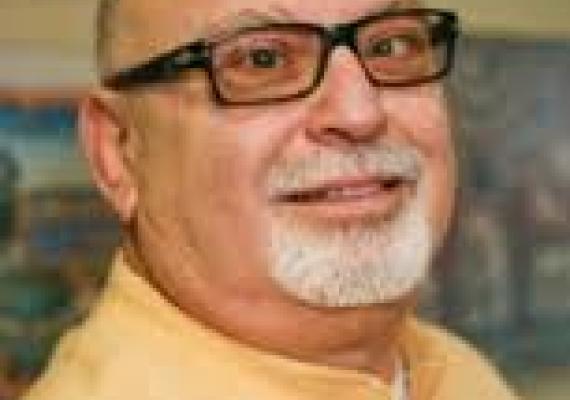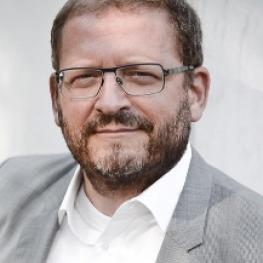In Memoriam: Shlomo Berger

We are deeply saddened to learn of the sudden passing earlier this week of Shlomo Berger, professor at University of Amsterdam and longtime friend of the Katz Center. He was a fellow during the year on The Jewish Book: Material Texts and Comparative Contexts (2005-2006) and we had certainly hoped to see him return.
Professors Avriel Bar Levav, Rachel Rojanski, and Andrea Schatz composed a necrology, and we share the following lovely memorial from Shlomo's longtime friend and colleague, Emile Schrijver. (You can also find it posted here, in Dutch and English.)
In Memoriam Prof. Dr Shlomo Z. Berger (1953–2015)
"A tayerer fraynd," a much-loved friend: those were the words that came to mind when I received the startling news that Shlomo Berger had passed away last Wednesday, 19 August 2015. He would have been 62 on 1 September. He died following an acute bacterial infection which he fought off for a few days, yet ultimately in vain, leaving his friends and colleagues devastated.
Born in Tel Aviv, Shlomo Berger attended Ben-Gurion University of the Negev in Beer Sheva and Hebrew University in Jerusalem. There he gained his doctorate in Ancient History in 1987, with a thesis on Revolution and Society in Greek Sicily and Southern Italy, which appeared in print in 1992. It was shortly after this that he was invited by Prof. Dr Rena Fuks-Mansfeld to come to the University of Amsterdam, where he worked on two post-doctoral projects and began teaching in 1995. He taught Jewish History, Modern Hebrew, History of Modern Literature and Yiddish, the language of his mother as he fondly recalled. On 1 January 2005, the status of his Yiddish course was elevated when he was appointed extraordinary professor in Yiddish Language and Culture (with special reference to the Netherlands) under the auspices of Menasseh ben Israel Institute. The formal reason for establishing the chair was that the University of Amsterdam wished to safeguard Yiddish as an academic study; the informal reason was that the proposed candidate, Shlomo Berger, had long been professorable. Funding and continuation of the chair had only recently been organised in yet another testimony to the magnificent scholarship and mammoth reputation of this most modest of men.
His academic articles, the first of which appeared in 1988, focused originally on the Ancient World, an interest that remained close to his heart; later, following the publication of his Classical Oratory and the Sephardim of Amsterdam: Rabbi Aguilar’s ‘Tratado de la retórica’ in 1996, in which he combined his classical expertise with his Jewish knowledge, he moved definitively into the world of Jewish Studies. He always regarded himself primarily as a historian, less so a Yiddish scholar, although he adored Yiddish (and Hebrew) language and literature and held many an impassioned lecture on the subject. In recent years he gradually drew closer towards the study of the Jewish book, a subject to which he brought many innovative contributions. His latest volume, with the poetic title Producing Redemption in Amsterdam: Early Modern Yiddish Books in Paratextual Perspective, appeared in 2013. It is a curious work which is based on a meticulous scrutiny of forewords, title pages, approbations and epilogues, paratext, in Yiddish books published in Amsterdam. While the study of this kind of text, which French historian Gérard Genette neatly describes as ‘the fringe of the actual text’ has received considerable attention among students of the non-Jewish book, it was Shlomo Berger who first applied this form of research to Jewish books, indeed to date he is the only scholar to have ventured into this particular area. I cherish warm memories of our many discussions; he would often visit Bibliotheca Rosenthaliana as he prepared for the publication and we would peruse this or that Yiddish book together and discuss the greater or lesser significance of some aspect of paratext.
That pleasure in the study of old sources is something we had shared for many years. Berger published his Travels among Jews and Gentiles: Abraham Levie's Travelogue (Amsterdam 1764) in 2002, an historical analysis of one of my favourite manuscripts in the Bibliotheca Rosenthaliana collection: a Yiddish account by Abraham Levi of his journey through Europe, written in 1764. We spent many hours poring over that manuscript. Sadly, he never got to finish his planned book on Readers and Modes of Reading in Yiddish, 1500-1850.
He was an original thinker who stood firmly for the importance and above all for maintaining the highest standards in scholarship and his chosen terrain. He brooked no compromise in that respect. If a person’s work was below par he saw no reason not to say so in the most explicit terms. To engage in Jewish Studies it is essential to know all the relevant languages, he was convinced of this, and not without reason. Moreover, researchers should dare to venture beyond their own methodology and specialisation. If his candour was resented and resulted in the rupture of a relationship, so be it; he could not do otherwise, and he could never hide his frustration whenever he detected a lack of quality or a lack of genuine effort.
Menasseh ben Israel Institute’s major international research project into Yiddish in the Netherlands as an Expression of Ashkenazic Culture, which we set up in the late 1990s with Marion Aptroot, Irene Zwiep, Rena Fuks-Mansfeld, Henk Meijering and Falk Wiesemann, would have been totally different without him. I look back with pleasure at the countless hours we spent together at the computer in my Menasseh ben Israel Institute office in Amsterdam’s Jewish Historical Museum, juggling texts in our respective English, arguing the benefits of one formulation against another. He had a profound distaste for the red tape that Dutch and German bureaucracy entailed, and was not averse to saying so with undisguised relish, yet he understood that administration was required if he was to achieve his academic goals and so he was prepared to knuckle down time and again to make yet one more effort. Together with Irene Zwiep, he started a periodical, Zutot: Perspectives on Jewish Culture, first published in 2001 by Brill in Leiden, and he was on the editorial board of Studia Rosenthaliana, Bibliotheca Rosenthaliana’s scholarly journal. As an extraordinary professor, he was also editor of a series of Menasseh ben Israel Institute publications issued after each of the annual Amsterdam Yiddish Symposia that he organised, the ninth volume of which recently appeared.
Shlomo Berger was a cosmopolitan. He was an Israeli Amsterdammer who had worked all over the world, from Jerusalem to Philadelphia, and from Ann Arbor, Michigan, to Dublin (where he had just been appointed external examiner for Jewish Studies at Trinity College). Spain was a particular love of his, where he would regularly take a pile of books and recharge his batteries in the sun, and not to mention every researcher’s Valhalla: Oxford. In Oxford he was Visiting Fellow at Brasenose College and had recently led an Oxford Seminar in Advanced Jewish Studies at Oxford Centre for Hebrew and Jewish Studies on ‘Jewish Books in Amsterdam, 1650-1850: Authors, Producers, Readers and the Construction of Jewish Worlds’. Indeed, he was a past master at thinking up these ingenious titles. There, in his beloved Oxford, is where I saw him last, we lunched together in the Common Room at Brasenose College where he basked visibly in the gently elitist atmosphere of the place, and where we enjoyed the excellent food and drink after my own lecture at his seminar. It never occurred to me that this might be the last time we would embrace. Jewish Studies will be the poorer now that this thoroughbred intellectual has left us. And like so many other friends, colleagues and students, I shall cherish the memory of this ardent, curious man, an aesthete in every fibre of his being, my "tayerer fraynd."
